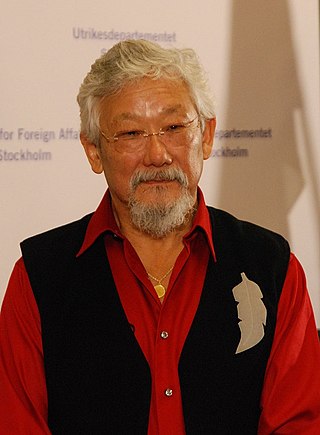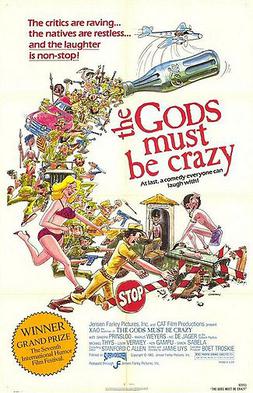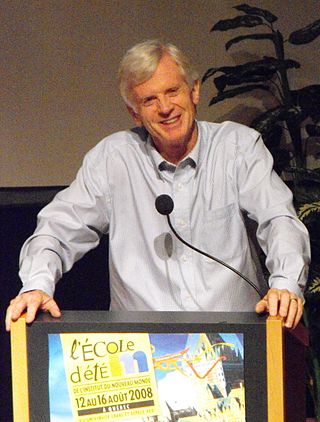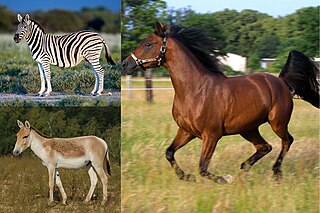
David Takayoshi Suzuki is a Canadian academic, science broadcaster, and environmental activist. Suzuki earned a PhD in zoology from the University of Chicago in 1961, and was a professor in the genetics department at the University of British Columbia from 1963 until his retirement in 2001. Since the mid-1970s, Suzuki has been known for his television and radio series, documentaries and books about nature and the environment. He is best known as host and narrator of the popular and long-running CBC Television science program The Nature of Things, seen in over 40 countries. He is also well known for criticizing governments for their lack of action to protect the environment.
A brain transplant or whole-body transplant is a procedure in which the brain of one organism is transplanted into the body of another organism. It is a procedure distinct from head transplantation, which involves transferring the entire head to a new body, as opposed to the brain only. Theoretically, a person with complete organ failure could be given a new and functional body while keeping their own personality, memories, and consciousness through such a procedure. Neurosurgeon Robert J. White has grafted the head of a monkey onto the headless body of another monkey. EEG readings showed the brain was later functioning normally. Initially, it was thought to prove that the brain was an immunologically privileged organ, as the host's immune system did not attack it at first, but immunorejection caused the monkey to die after nine days. Brain transplants and similar concepts have also been explored in various forms of science fiction.

The Gods Must Be Crazy is a 1980 comedy film written, produced, edited and directed by Jamie Uys. An international co-production of South Africa and Botswana, it is the first film in The Gods Must Be Crazy series. Set in Southern Africa, the film stars Namibian San farmer Nǃxau ǂToma as Xi, a hunter-gatherer of the Kalahari Desert whose tribe discovers a glass Coca-Cola bottle dropped from an aeroplane, and believe it to be a gift from their gods. When Xi sets out to return the bottle to the gods, his journey becomes intertwined with that of a biologist, a newly hired village school teacher, and a band of guerrilla terrorists.

David William Kilgour was a Canadian human rights activist, author, lawyer, and politician. He was also a Senior Fellow to the Raoul Wallenberg Centre for Human Rights.

White Wilderness is a 1958 nature documentary film produced by Walt Disney Productions as part of its True-Life Adventure series. It is noted for its propagation of the myth of lemming mass suicide.
The Nature of Things is a Canadian television series of documentary programs. It debuted on CBC Television on 6 November 1960. Many of the programs document nature and the effect that humans have on it, although the program's overall scope includes documentaries on any aspect of science. The program "was one of the first mainstream programs to present scientific evidence on a number of environmental issues, including nuclear power and genetic engineering".

Equus is a genus of mammals in the family Equidae, which includes horses, asses, and zebras. Within the Equidae, Equus is the only recognized extant genus, comprising seven living species. Like Equidae more broadly, Equus has numerous extinct species known only from fossils. The genus originated in North America and dispersed into the Old World and South America during the Early and Middle Pleistocene. Equines are odd-toed ungulates with slender legs, long heads, relatively long necks, manes, and long tails. All species are herbivorous, and mostly grazers, with simpler digestive systems than ruminants but able to subsist on lower-quality vegetation.
The Passionate Eye is a Canadian documentary television series—and online playlist—that showcases documentary programming from around the world focusing on topics of news, current affairs, politics, and social issues. Airing on CBC News Network, it has been on-air since 1992, and has had a website since 2002.
Dr. A. M. James Shapiro is a British-Canadian surgeon best known for leading the clinical team that developed the Edmonton Protocol – an islet transplant procedure for the treatment of type 1 diabetes. Dr. Shapiro is Professor of Surgery, Medicine, and Surgical Oncology at the University of Alberta and the Director of the Clinical Islet Transplant Program and the Living Donor Liver Transplant Program with Alberta Health Services.

Vladimir Petrovich Demikhov was a Soviet Russian scientist and organ transplantation pioneer, who performed several transplants in the 1940s and 1950s, including the transplantation of a heart into an animal and a heart–lung replacement in an animal. He is also well known for his dog head transplants, which he conducted during the 1950s, resulting in two-headed dogs. This ultimately led to the head transplants in monkeys by Robert White, who was inspired by Demikhov's work.
Gordon Edwards is the president and co-founder of the nonprofit organization Canadian Coalition for Nuclear Responsibility.
The Academy of Canadian Cinema & Television's 6th Gemini Awards were held in March 1992 to honour achievements in Canadian television. There were no awards issued in 1991, so this year’s awards covered productions from 1991 and 1990. The awards show took place at the Metro Toronto Convention Centre and was broadcast on CBC Television.
Diane Van Deren is an American ultra-runner who won the Yukon Arctic Ultra 300 in 2009. Van Deren had a lobectomy in 1997. She competed in races of attrition measuring 100 miles or more. She was the first woman to complete the 430-mile Yukon Arctic Ultra 300.
Kensington Communications is a Toronto-based production company that specializes in documentary films and documentary/factual television series. Founded in 1980 by president Robert Lang, Kensington Communications Inc. has produced over 250 productions from documentary series and films to performing arts and children's specials. Since 1998, Kensington has also been involved in multi-platform interactive projects for the web and mobile devices.

A heart transplant, or a cardiac transplant, is a surgical transplant procedure performed on patients with end-stage heart failure or severe coronary artery disease when other medical or surgical treatments have failed. As of 2018, the most common procedure is to take a functioning heart, with or without both lungs, from a recently deceased organ donor and implant it into the patient. The patient's own heart is either removed and replaced with the donor heart or, much less commonly, the recipient's diseased heart is left in place to support the donor heart.
The 26th Gemini Awards was held on September 7, 2011 to honour achievements in Canadian television. The ceremony was broadcast live from the Canadian Broadcasting Centre in Toronto, and aired on CBC Television. The show was hosted by Russell Peters, and included live musical performances by Jim Cuddy, Deborah Cox and City and Colour.
Allegations of forced organ harvesting from Falun Gong practitioners and other political prisoners in China have raised concern within the international community. According to a report by former lawmaker David Kilgour, human rights lawyer David Matas and journalist Ethan Gutmann of the US government–affiliated Victims of Communism Memorial Foundation, political prisoners, mainly Falun Gong practitioners, are being executed "on demand" in order to provide organs for transplant to recipients. Reports have said that organ harvesting has been used to advance the Chinese Communist Party's persecution of Falun Gong and because of the financial incentives available to the institutions and individuals involved in the trade. A report by The Washington Post has disputed some of the allegations, saying that China does not import sufficient quantities of immunosuppressant drugs, used by transplant recipients, to carry out such quantities of organ harvesting. However, the Victims of Communism Memorial Foundation alleged that the Post's article made an “elementary statistical error” and omitted unofficial pharmacy data in Chinese hospitals.
Tom Radford is a Canadian documentary filmmaker from Edmonton, Alberta. A cofounder with Anne Wheeler and P. J. Reese of the Filmwest Associates studio, Radford is most noted for films on the history, culture and politics of Western Canada.
Rosvita Dransfeld, sometimes credited as Rosie Dransfeld, is a Canadian documentary filmmaker. She is most noted for her 2009 film Broke, which won the Donald Brittain Award for Best Social or Political Documentary at the 25th Gemini Awards in 2010.

Darren Fung is a Canadian film and television composer based in Los Angeles. He is best known for scoring The Great Human Odyssey, Equus: Story of the Horse, Bang Bang Baby, and Canada AM.








